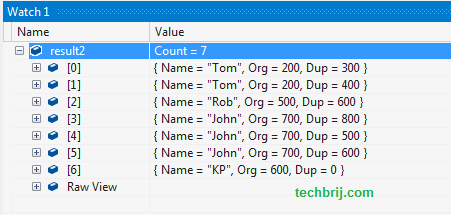This post is in reply of this thread of the official ASP.NET forum.
The input data is in following format:
| S.no | Name | wages |
|---|---|---|
| 1 | Tom | $200 |
| 1 | Tom | $300 |
| 1 | Tom | $400 |
| 2 | Rob | $500 |
| 2 | Rob | $600 |
The required output is in following way:
| Name | OriginalWage | DuplicateWage |
|---|---|---|
| Tom | $200 | $300 |
| Tom | $200 | $400 |
| Rob | $500 | $600 |
It looks interesting to combine each person first record to all other records using LINQ. So I decided to write this post.
For sample input data in c#:
var ret = new[]{
new { SNO=1,Name="Tom",Wages=200 },
new { SNO=1,Name="Tom",Wages=300 },
new { SNO=1,Name="Tom",Wages=400 },
new { SNO=2,Name="Rob",Wages=500 },
new { SNO=2,Name="Rob",Wages=600 },
new { SNO=3,Name="John",Wages=700 },
new { SNO=3,Name="John",Wages=800 },
new { SNO=3,Name="John",Wages=500 },
new { SNO=3,Name="John",Wages=600 }
};
To get the desired result:
var result = (from item in ret
group item by item.SNO into grp
let org = grp.First()
let dup = grp.Skip(1).Select(x => new { Name = org.Name, Org = org.Wages, Dup =x.Wages})
select dup).SelectMany(x=>x).ToList();
it will generate the required output.
What will happen if there is only one row of the person? In this case, the row will be skipped. Consider following input:
var ret = new[]{
new { SNO=1,Name="Tom",Wages=200 },
new { SNO=1,Name="Tom",Wages=300 },
new { SNO=1,Name="Tom",Wages=400 },
new { SNO=2,Name="Rob",Wages=500 },
new { SNO=2,Name="Rob",Wages=600 },
new { SNO=3,Name="John",Wages=700 },
new { SNO=3,Name="John",Wages=800 },
new { SNO=3,Name="John",Wages=500 },
new { SNO=3,Name="John",Wages=600 },
new { SNO=4,Name="KP",Wages=600 }
};
The last person record will be skipped.
To get records of all persons (set default duplicate wage = 0 in case of single record):
var result2 = (from item in ret
group item by item.SNO into grp
let org = grp.First()
let dup = grp.Count() >1
? grp.Skip(1).Select(x => new { Name = org.Name, Org = org.Wages, Dup = x.Wages })
: grp.Select(x => new { Name = org.Name, Org = org.Wages, Dup = 0 })
select dup).SelectMany(x => x).ToList();

Hope, It helps.